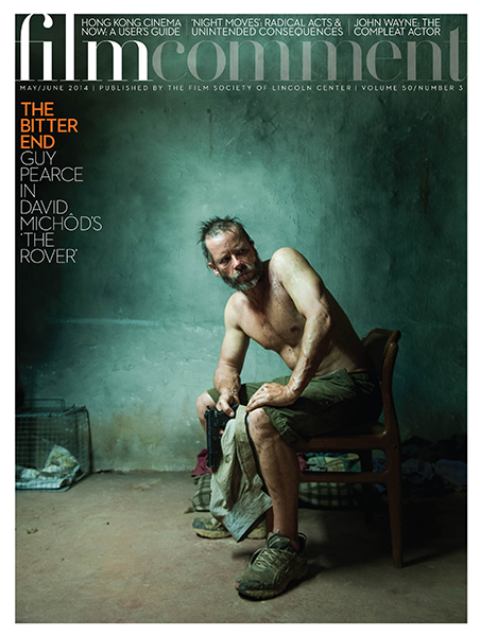
A brief hiccup early in Palo Alto resonates throughout Gia Coppola’s debut film, at least for habitués of American teen-angst classics. High-school virgin April (a luminous Emma Roberts, daughter of Eric, niece of Julia) is babysitting for her ominously hunky soccer coach Mr. B (James Franco), watching TV with his young son. The Cars’ “Moving in Stereo” emanates from the speakers, heralding that primal scene of late-century premium cable: Phoebe Cates’s slo-mo breast-baring in Fast Times at Ridgemont High. But Eros yields to the Uncanny as we discern a sequence with identical mise en scène but a not-quite-Cates and a tinny cover version of the song. Why this near-perfect re-cast, re-shot, re-recorded, and fine-tuned 10-second simulacrum? And why are our minds drifting to ponder the intricacies of music royalty law in the midst of a sexually charged youth drama?
Such moments of metatextual drift may simply be the baggage that comes with being Gia Coppola, a filmmaker theoretically capable of developing a sure feel for the medium with reference only to films made by family members. Her grandfather, Francis Coppola, enlisted his offspring to appear in his films upon birth; her big-sister aunt, Sofia, just 16 years older, did more to launch Gia’s career than enlist her as costume supervisor for Somewhere. In Lost in Translation, characters, scenario, and setting aligned with a cohering aesthetic of romantic languor and disconnect to produce such bliss it would soften the hearts of all but the most committed haters of the Coppola dynasty.
Palo Alto promises greatness as it opens. Two tousle-haired teenagers ruminate in the front of a car moored at the edge of a dark suburban parking lot, faces lit by cold fluorescent streetlamps and the intermittent glow of a blazing joint. Dark, twitchy Fred (Natt Wolff) is behind the wheel, shaggy blond Teddy (Jack Kilmer, son of Val) is slumped beside him, as their brief Beavis and Butt-head dialectic on time travel peters out into an exchange of halfhearted insults and fuck-yous.

Then, seized by an impulse, Fred (who could be Ferris Bueller’s id) shouts, “I’m the king round these parts” and, with a rebel yell, stomps the gas to go out in a blaze of glory. Coppola cuts to a wide-shot reveal of the car roaring forward three feet into a wall to the distant sound of Fred’s triumphant cackles—concluding this brisk invocation of the impotent closed-loop rebellion of the ’burbs.
Several other high-performance sight gags follow as the often more than familiar coming-of-age tale unfolds. Drawing from Franco’s loosely connected short stories about his posh Northern California hometown, Palo Alto renders moneyed angst and ennui in vogueish hues: woozy camerawork, fractured dialogue, lo-fi indie-pop, perilous drug use, and long takes of kohl-eyed, clear-skinned faces brooding, sulking, and puking into bushes. The material is Fast Times and The Virgin Suicides shot through a Larry Clark/Van Sant filter, as performed by scions of Hollywood royalty. At the decadent house party that begins things, April exchanges furtive glances with Teddy, failing to connect and spinning out of the party with the rest of the characters down various well-trodden sordid paths. Teddy gets bullied into self-harming rebellion by Fred, April falls prey to the irrepressible Franco’s corruptor of young girls, and pretty Emily (Zoe Levin) gives blow jobs like handshakes. The fragmented dialogue sounds authentically adolescent in some scenes, in others like place-holding boilerplate awaiting a rewrite.
Parents are mostly absent, stoned, or sinister; the kids are left to play with fire; Jack Kilmer is styled and shot like a mid-Nineties River Phoenix; Francis Ford Coppola supplies the voice of an off-screen judge. This family affair is so faithful to Gia’s inspirations that it often feels like an exquisite visual essay on the cinema of dreamy troubled youth. Whether this is homage or undigested source material, we stay at one remove from human feeling.
I suspect that part of what made Lost in Translation soar as it did was how closely its surreal lives aligned with the director’s, how its specificity let it breathe universal air. A quick scan of Gia’s star-crossed bio indicates that she knows a far richer, sadder world than anything in the angsty-affluent teenage film canon. Raised in Los Angeles and points north, Coppola may, like her aunt, regard traffic the way Wordsworth regarded daffodils, since the most promising visual poetry in Palo Alto is the kind that begins and ends Sofia’s Somewhere—vehicular renditions of psychic and existential states. But I hear more pathos in April’s exchange with her stepdad (Val Kilmer in a David Foster Wallace headband). Stoned and sprawled out at his writer’s desk, he hands back a school paper his daughter has asked him to clean up, exhaling a hydroponic cloud. “You could have just corrected it,” she says. “You didn’t have to rewrite the whole thing.” The moment broke my heart, but I probably read too much into these things.








